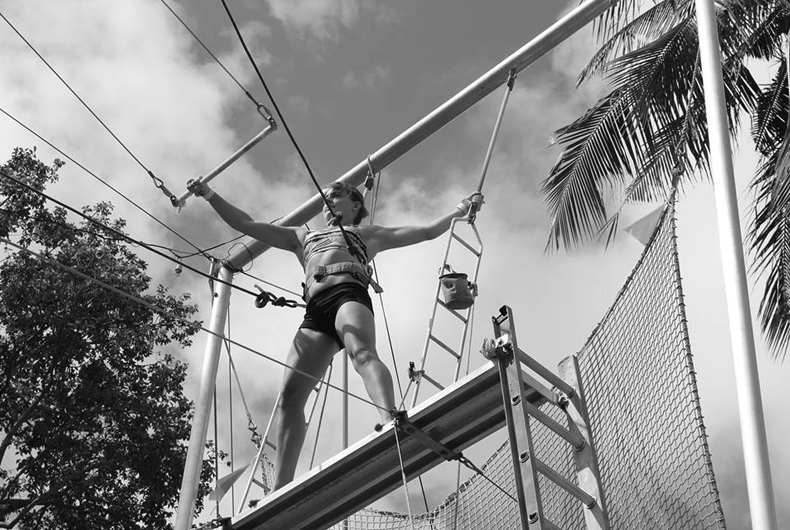Two steps forward, one step back. Be aware of the natural cycle of learning, and don’t fight it. Allow it to work it’s magic. Your body has to go on it’s own journey for a trick to become second nature, and just because the trick doesn’t look or feel as good as yesterday, doesn’t mean you’re not progressing. Your body is always telling you something – don’t fight it, just listen. We often have to return to the fundamentals, the basic principles again and again, the swing, the turnaround, before we can progress to a new level. If you engage with this process in all it’s ups and downs, you will stop beating yourself up and will find the whole experience much more fulfilling.
The Fear. It is inevitable. What we are asking our bodies and minds to overcome every single time we get up there to fly is almost insurmountable. The only people I really know who never suffer from the fear are those who have been flying since before they could walk (for example the wonderful Maicon from Toulouse). Sadly, for the rest of us, the Fear is a reality we have to live with, and the more intimately we examine it, feel it and understand it, the more control we have over it and the less control it has over us. My advice is – really make the most of the days you are feeling fierce, flying free as a bird, train hard and train relentlessly. And when you are struggling, feeling about as aerodynamic as a little mouse, be kind to yourself, and go back to what you do well.
Visualisation and focus. I would say that, for myself, flying trapeze is 70% mindset, and 30% physical ability. My performance varies drastically depending on where my head is at that day. This is part of the reason I adore it so much, it is my own personal form of meditation, requiring absolute focus and concentration. When I arrive at the rig I have to leave all of my insecurities, anxieties and worries at the door. There is only space for the task at hand. The ultimate moment for this is on the platform – after lines, after chalk, after any instruction. Taking 10 seconds, and 2 deep breaths, visualising the trick at hand in it’s entirety, what every moment of it should feel like in my body, and focusing in on where I need to place emphasis. You owe yourself that much.
Change. (I am a big fan of change). Change instructors, change location, change rigs. Fuck it, even change languages. It will keep you on your toes. Instructors will use different metaphors, describe tricks in different ways, use different key words. Different things work for different people, and even though the end goal is always the same, it is always healthy to turn it upside down and look at it from a new perspective. Changing rigs encourages you to be an adaptable flyer. Being able to cope with different weight bars, different types of bar wraps, different calls to the catcher, different surroundings and rig dimensions only strengthens you as a flyer.
Take a break. Whether it’s frustration over a particular trick, a niggling rotator cuff or physical exhaustion – know when to call your own time out. Again and again I see flyers return after a break with cleaner lines, more focused energy, and nailing the tricks first time that they’d been battling with for months. People often underestimate the power of watching. We should always watch twice as much as we fly, and watch actively not passively. There is a whole wealth of knowledge to be learnt in other people’s abilities and other people’s struggles, if only you look close enough.
Ego. It is important to be inspired by others, but don’t knock yourself for not being as good as the next flyer in your class. Everyone learns at different speeds – that’s okay. Everyone has different strengths and weaknesses – that’s also okay. Circus in it’s very nature is non-competitive, all-inclusive and non-regimented. Let’s not treat the flying trapeze as an olympic sport, and lose the wonders of the world that it was born out of. Respect those who have flown before you, respect those who fly alongside you, and respect yourself as a flyer, no matter what your ability.
N.B. Some of this may be applicable to other sports, I’m not too sure. It certainly applies to kitesurfing, the only other sport I’ve had much experience with. Let me know what you think.

